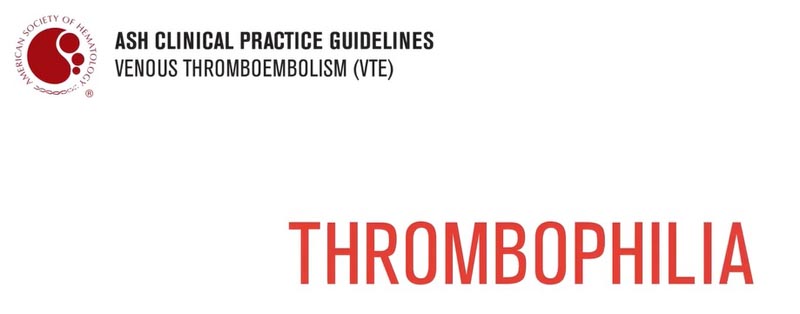
2023 American Society of Hematology Guidelines for the Treatment of Venous Thromboembolism: Thrombophilia Testing
ASH VTE Guidelines: Thrombophilia Testing
Thrombophilias include a variety of genetic mutations that are associated with an increased risk of VTE. Thrombophilia, whether acquired or inherited, can be identified in many patients who present with venous thromboembolism (VTE).
The currently most commonly tested inherited thrombophilias include antithrombin, protein C, or protein S deficiencies, and the gain-of-function mutations Factor V Leiden (FVL) and prothrombin G20210A (PGM).
Lupus anticoagulant, anticardiolipin antibodies, and anti‐ß2‐glycoprotein1 antibodies, which are laboratory features of acquired antiphospholipid thrombophilic syndrome (APS), are also generally included in a panel of thrombophilia tests.
Thrombophilia testing may be performed in patients with VTE, particularly if they are young, have recurrent episodes, have thrombosis at unusual sites, or have a positive family history of the disease. The purpose of these guidelines is to provide evidence-based recommendations about whether thrombophilia testing and personalized management based on the test result would improve important patient outcomes.
Description of health problem(s)
Thrombophilia is a generic term used for several acquired or inherited conditions that indicate that a patient has a higher than normal risk of VTE. Acquired thrombophilia also increases the risk of pregnancy complications. The heritability of VTE, that is, the proportion of variation attributable to genetic effects, is estimated to be as high as 60%. There are several known genetically determined defects associated with thrombophilia, collectively linked to at least one-third of VTE cases.
This guide focuses on the most common inherited thrombophilias , which include gain-of-function mutations in factor Va, i.e., the FVL mutation (FVL), and the G20210A mutation of the prothrombin gene (PGM), as well as deficiencies of antithrombin, protein C, and protein S.
Among acquired thrombophilias , we focused on APS [defined as one or more of lupus anticoagulant, anticardiolipin antibodies and anti-ß2-glycoprotein1 antibodies combined with clinical criteria)].
This guideline refrains from providing guidance on tests that have been shown not to be associated with VTE or have not been conclusively associated with VTE. Since in many clinical settings thrombophilia is tested as a panel, we will generally consider the "testing for any thrombophilia" scenario . Selective testing is the term used to "evaluate a specific thrombophilia defect" , which is of interest in families with known carriers of a specific defect. Details on the underlying pathophysiology and genetics of thrombophilia can be found in other reviews. It is important to note that thrombophilia test results should be interpreted with knowledge of clinical pitfalls in laboratory testing.
Background:
Hereditary and acquired thrombophilia are risk factors for venous thromboembolism (VTE) . It is controversial whether evidence helps guide management decisions.
Aim:
These evidence-based guidelines from the American Society of Hematology (ASH) are intended to support decision-making regarding thrombophilia testing.
Methods:
The American Society of Hematology (ASH) H formed a multidisciplinary guideline panel that covered clinical and methodological expertise and minimized bias from conflicts of interest. The GRADE Center at McMaster University provided logistical support, conducted systematic reviews, and created evidence profiles and evidence-to-decision tables. The Grading of Recommendations Assessment, Development and Evaluation (GRADE) approach was used . The recommendations were subject to public comment.
Results:
The panel agreed on 23 recommendations regarding thrombophilia testing and associated management. Almost all recommendations are based on very low certainty in the evidence due to model assumptions.
Conclusions:
The panel issued a strong recommendation against testing the general population before starting combined oral contraceptives (COCs) and conditional recommendations for thrombophilia testing in the following scenarios:
a) Patients with VTE associated with significant non-surgical hormonal or transient risk factors.
b) Patients with cerebral or splanchnic venous thrombosis, in settings where anticoagulation would otherwise be discontinued.
c) Individuals with a family history of antithrombin, protein C, or protein S deficiency when considering thromboprophylaxis for minor provoking risk factors, and as a guide to avoid COC/HRT.
d) Pregnant women with a family history of high-risk types of thrombophilia.
e) Patients with cancer at low or intermediate risk of thrombosis and with a family history of VTE.
For all other questions, the panel provided conditional recommendations against thrombophilia testing .















